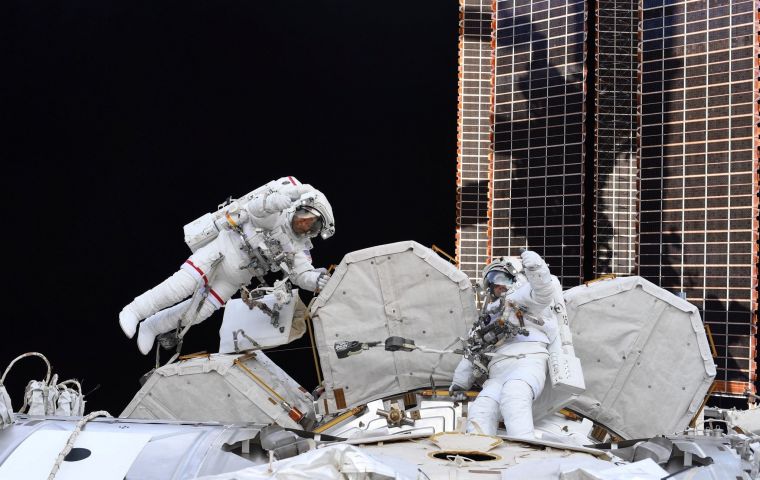MercoPress. South Atlantic News Agency
NASA and Russians continue to operate jointly the Space Station
 “Our operations are nominal” said NASA's Kathy Lueders. “We've operated in these kind of situations before and both sides always operated very professionally”
“Our operations are nominal” said NASA's Kathy Lueders. “We've operated in these kind of situations before and both sides always operated very professionally” The US space agency, NASA, said on Monday that the agency continues to operate the International Space Station with all its partners, including Russia. However, there is close contact with the State Department.
“Our operations are nominal,” said Associate Administrator for Space Operations Kathy Lueders. She acknowledged that NASA continues to monitor the situation in Ukraine and work with the US State Department. “We've operated in these kind of situations before, and both sides always operated very professionally and understand at our level the importance of this fantastic mission.”
NASA flight controllers and other officials continue to work in Moscow, she said, and US and Russian managers have good communication. At the “working level,” at least, there are no signs of trouble. “We, as a team, are operating just like we were operating three weeks ago,” she said.
The space agency still plans to have NASA astronaut Mark Vande Hei return to Earth on Russian Soyuz spacecraft in April, landing in Kazakhstan with two Russian crewmates. Typically, NASA officials travel to Russia and then Kazakhstan to be present for the landing. Lueders said all of the normal procedures for the landing are expected to proceed.
Lueders made these comments during a teleconference with reporters on Monday to discuss the forthcoming Axiom 1 mission to the space station. Flying aboard SpaceX's Crew Dragon vehicle, this will be the first completely private mission to visit to the space station.
But the 10-day flight, launching no earlier than March 30, comes against a backdrop of uncertainty about the space station's future. Russia has not confirmed participation in the project after 2024, and although Lueders said the 15 nations involved in the station have weathered previous geopolitical tensions, there has been nothing like this before during the project's 20 years of existence.
European space faring nations, in particular, have expressed alarm at Russia's invasion of Ukraine. On Monday, the European Space Agency issued a statement saying, “We deplore the human casualties and tragic consequences of the war in Ukraine.”
NASA has yet to issue such a statement condemning Russia's action, and Lueders and other senior officials appear eager to preserve the partnership if at all possible. At present, NASA and Roscosmos must work together to keep the station flying. Russia provides fuel and thruster capability to periodically re-boost the space station to a higher altitude, and NASA gyroscopes provide stability, while its solar panels generate the vast majority of electricity.




Top Comments
Disclaimer & comment rulesCommenting for this story is now closed.
If you have a Facebook account, become a fan and comment on our Facebook Page!